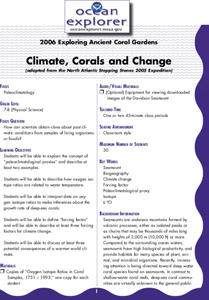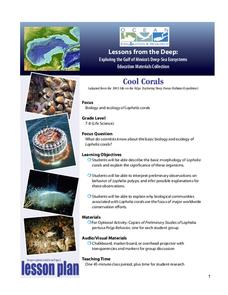Curated OER
Faking It
Middle school earth scientists describe the behavior of the Coriolis force. They compare and contrast conditions under which the Coriolis force has a significant impact with conditions under which it has very little. They model the...
ARKive
Galapagos Conservation
The Galapagos Islands inspired Darwin to develop his theory of evolution. These wonderful islands will also be the topic of a lesson on habitat and conservation. In small groups, learners will collect and synthesize information regarding...
Curated OER
Turtle and Tortoise Preschool Lesson Plan
One of the best parts about teaching the littlest learners is that you can create thematic lessons that use one topic to address every subject. Here is a nice set of thematic teaching ideas that uses turtles and tortoises to teach...
Michigan State University
Bug Lyphe!
Introduce ecology classes to biodiversity and interdependence in ecosystems with a PowerPoint presentation. Then, they get up-close and personal with the invertebrate world by collecting insects, classifying them, and graphing their...
Foundation for Water & Energy Education
How Can Work Be Done with Water Power? Activity C
Third in a set of lessons regarding reservoirs, dams, and hydropower, this involves a two-day hydropower plant simulation. Collaborative groups build, maintain, and finance the plant. The transparency of the reservoir setup can be...
Teach Engineering
Live Like an Animal
When your parents say that your room's a pig sty, tell them about biomimicry. The sixth installment of a nine-part Life Science unit has scholars research the shelters used by animals in the natural world, like turtle shells. Using the...
Curated OER
Speedy Succession
Fifth graders identify how a pond can change into a grassland. An ecosystems activity where learners identify pioneer and climax species, and recognize that ecological succession can take up to 100 years or more. Some excellent...
NOAA
Climate, Corals and Change
Global warming isn't just an issue on land; deep ocean waters are also showing troubling signs. Young scientists learn more about deep water corals and the many recent discoveries researchers have made. Then they examine data related to...
BBC
Ourselves
Young biologists identify parts of the body, sort humans from other animals, and list the difference they see. Learners are split up into groups of three, and each group must find pictures in magazines of humans and other animals. They...
Curated OER
Writing Process- Expository Writing
Expository writing is the focus of the language arts lesson presented here. In it, young writers review what expository writing is through a class discussion and teacher demonstration. Then, learners write expository text that describes...
National Park Service
Living & Non-Living Interactions
What better way to learn about ecosystems than by getting outside and observing them first hand? Accompanying a field trip to a local park or outdoor space, this series of collaborative activities engages children in learning about the...
Education Outside
Creature Jeopardy!
After conducting research on a given scientific animal name, group members take a walk around their school and look for the specified animals in that classification. Then, they come back to their worksheets and create five creative clues...
Florida Department of Environmental Protection
Water's Journey Expedition
Step into a scientist's shoes to go online and discover the Florida Springs Expedition, and participate in two activities focusing on how humans impact the environment. The first activity asks scholars to summarize the six dispatches at...
Virginia Department of Education
Predator-Prey Simulation
Do your pupils have the misconception that environmental predators are "bad" and harm smaller creatures? The simulation explains, in detail, the important role predators play in maintaining a stable ecosystem. Through web-based research,...
NOAA
Deep-Sea Ecosystems – Cool Corals
Young oceanographers research deep sea corals that thrive on chemosynthesis. The lesson focuses on the biology of the animal, preferred habitat, associations, and interactions.
NOAA
Biological Oceanographic Investigations – Through Robot Eyes
How can a robot measure the length of something when we don't know how far the camera is from the object? The lesson explains the concept of perspective and many others. Scholars apply this knowledge to judge the length of fish and the...
American Museum of Natural History
Gusty: The Gut Microbiome Card Game
Build up your gut. Groups up to four play a card game to learn more about the microbiome in the gut. Learners try to build a healthy gut with their cards. The player acquiring six microbes without any pathogens wins the game.
Michigan State University
Inspecting The School
Keep your eyes peeled for pests! Here, scholars inspect their campus for signs of living things such as insects and rodents. Upon observation, class members record their findings and present the information to their peers.
BBC
Sorting and Using Materials
First and second graders see that everyday objects are made from a variety of materials. They interact with objects such as keys, plastic spoons, a wooden ruler, a towel, and a plastic bag. A discussion ensues which leads them to...
Curated OER
Feeding in the Flow
The National Oceanic and Atmospheric Administration (NOAA) has developed a tremendous library of ocean-themed lessons that can be used in a variety of science settings. "Feeding in the Flow" is one of those activities; Its focus is on...
Curated OER
CSI on the Deep Reef
After some instruction, small groups prepare a written report on chemotrophic organisms. Though not clearly mentioned, this resource would work best if groups have the Internet available to research the vocabulary and different organisms...
University of Southern California
Wave Erosion Lab
Using a stream table, erosion enthusiasts examine how the density of sediment and how the slope of land contribute to the amount moved by waves. You will not be able to use this entire resource as is; there are teachers' names and...
Michigan State University
May I Take Your Order?
If you're a pest, come and get a tasty meal here! Scholars work collaboratively to construct a mini restaurant out of a shoe box and create a menu that feeds a pest their favorite food.
Curated OER
WET Science Lesson #3: Comparison of Aquatic and Terrestrial Plants
Elementary life science explorers compare and contrast aquatic and terrestrial plants (elodea and soybeans) in a Venn diagram. Some background information is provided to support direct instruction, and general instructions are provided...
Other popular searches
- Animal Habitats
- Animals and Their Habitats
- Zoo Animals Habitats
- Desert Habitats
- Ocean Habitats
- Animals and Habitats
- Water Habitats
- Animals Habitats
- Science Habitats
- Powerpoint Animal Habitats
- Animal Habitats in Georgia
- Unit Lesson Plan Habitats

























